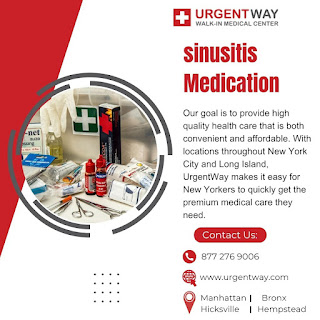What Steps Can Be Taken to Reduce the Likelihood of Recurrent Chronic Sinusitis Treatment?
What Steps Can Be Taken to Reduce the
Likelihood of Recurrent Chronic Sinusitis Treatment?
Although managing chronic sinusitis might be an ongoing
struggle, there are things you can do to reduce the chance of future attacks.
An extended period of infection of the sinus tubes is known as chronic
sinusitis. While medical interventions are important, treating chronic
sinusitis and lowering its recurrence can be greatly aided by implementing
specific lifestyle modifications and preventive measures. In this post, we'll
look at easy and useful actions you may take on a regular basis to lessen the effects
of persistent sinusitis.
Knowing About
Prolonged Sinusitis:
Before discussing ways to avoid chronic sinusitis, let's
review what it is. It happens when the air-filled cavities behind the eyes,
cheeks, and forehead—the sinuses—inflame. Breathing difficulties, face pain or
pressure, and congestion in the nose are common symptoms. Frequent bouts can
have a serious negative effect on a person's quality of life by causing missed
work, sleep disturbances, and general discomfort.
Easy Steps to Cut
Down on Repeated Episodes of Chronic Sinusitis:
Continue to Practice
Good Hygiene:
Hands should be often washed with soap and water to stop the
spread of bacteria and viruses that can lead to sinus infections.
Maintain Hydration:
To maintain the moisture in your nasal passages, drink lots
of water. Drinking enough water thins mucus, facilitating its excretion and
lowering the chance of infection.
Employ a Humidifier:
By adding a humidifier to your home, you can keep the air's
ideal moisture content and keep your nasal passages from drying out.
Use Nasal Irrigation
Techniques:
You might want to consider irrigating your nasal passages
with a saline solution. By removing mucous and irritants, this easy-to-use
method lowers the chance of illness.
Steer clear of
allergens:
Determine which allergies may cause episodes of sinusitis
and reduce your exposure to them. Mold, pet dander, dust mites, and pollen are
examples of common allergies.
Handle Allergies:
Work with your healthcare practitioner to appropriately
manage any allergies you may have. Reducing allergies can aid in avoiding nasal
passage inflammation.
Give Up Smoking:
Smoking can impede the healing process and exacerbate the
symptoms of sinusitis. One of the most important steps in lowering the risk of
recurring episodes is giving up smoking.
Limit Your Contact
with Irritants:
Steer clear of things that can irritate your nasal passages,
like chemicals, harsh scents, and pollutants.
Keep Up With Weather
Information:
Pay attention to how the weather changes, particularly in
the seasons that are known to cause sinusitis. Be cautious by wearing suitable
clothing and staying inside during days of severe weather.
Adhere to Proper
Respiratory Protocols:
When you sneeze or cough, cover your mouth and nose to stop
the spread of germs. After using tissues, dispose of them appropriately and
wash your hands.
Keep Up a Nutritional
Diet:
Consume a diet high in fruits, vegetables, and whole grains
that is well-balanced. An immune system that is strong is supported by proper
nutrition, which lowers the danger of infection.
Exercise Frequently:
Regular physical activity will strengthen your immune system
and improve your general health. Be sure to speak with your doctor before
beginning a new fitness program.
Think about
vaccinations:
Keep your immunizations, particularly the flu vaccine, up to
date. Vaccinations have the potential to prevent viral infections that cause
sinusitis.
Control Your Stress:
Prolonged stress can exacerbate inflammation and impair
immunity. Use stress-reduction strategies like meditation and deep breathing.
Treat GERD, or gastroesophageal
reflux disease:
To properly manage your GERD, collaborate with your
healthcare practitioner. Reducing the risk of recurrent episodes of GERD may
help, as it can contribute to sinusitis.
Obtain Enough Sleep:
Make getting a good night's sleep a priority to boost your
immune system and general wellness. Aim for seven to nine hours of good sleep
every night.
Prevent Using Decongestant
Nasal Sprays Excessively:
Decongestant nasal spray use over an extended period of time
might exacerbate sinusitis symptoms and cause rebound congestion. As instructed
by your healthcare practitioner, take these medications.
Replace and clean air filters on a regular basis:
To lessen indoor allergies, make sure the air filters in
your house's heating and cooling systems are clean and changed on a regular
basis.
Keep Your Distance
When Traveling:
To lessen the effects of fluctuations in air pressure, use a
saline nasal spray and drink plenty of water if you're prone to sinusitis,
especially when flying.
Obey the advice of
your healthcare provider:
Follow the recommended course of treatment as directed by
your physician. Observe follow-up visits, take prescription drugs as
prescribed, and report any changes in symptoms as soon as possible.
Conclusion:
A combination of pharmaceutical interventions and lifestyle
modifications are used to treat chronic sinusitis. You can take proactive steps
to lower the risk of repeated sinusitis episodes by implementing these easy
steps into your everyday routine. Seeking individualised advice and treatment
recommendations from your healthcare professional is crucial, as they will be
aware of your unique condition. Keep in mind that regular preventive measures
can significantly improve and promote sinus health.
Sinus Infection Doctor At UrgentWay Walk-In Clinic:
Sinus infection treatment is available at all UrgentWay locations. We are open seven days a week from morning to evening, giving you the freedom to visit us whenever it is convenient. Our experienced providers will assess your condition, advise the best sinus infection treatment accordingly and counsel you on preventative care.




Comments
Post a Comment